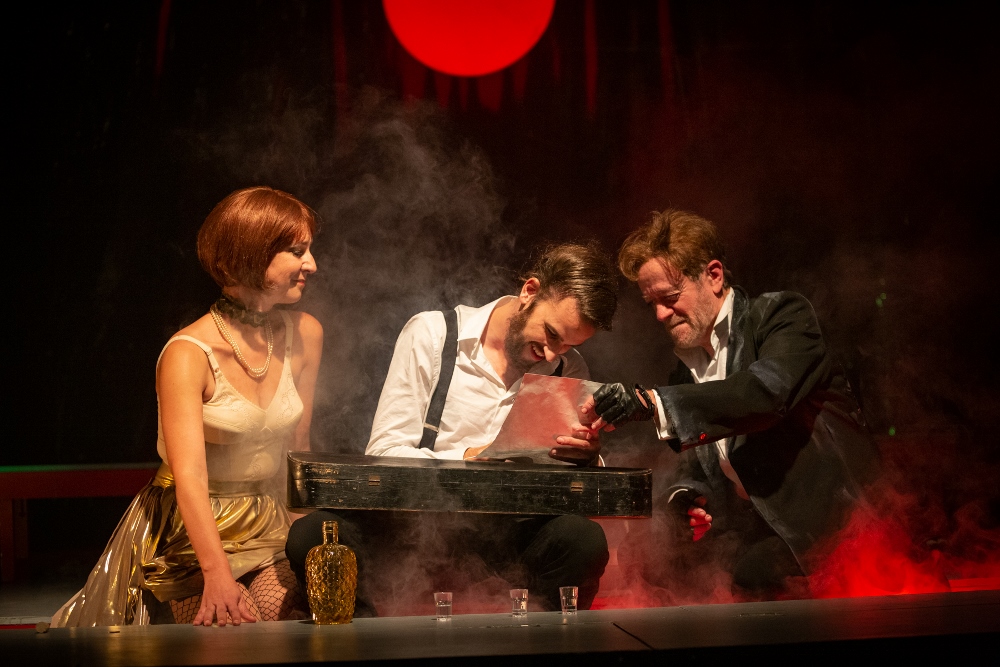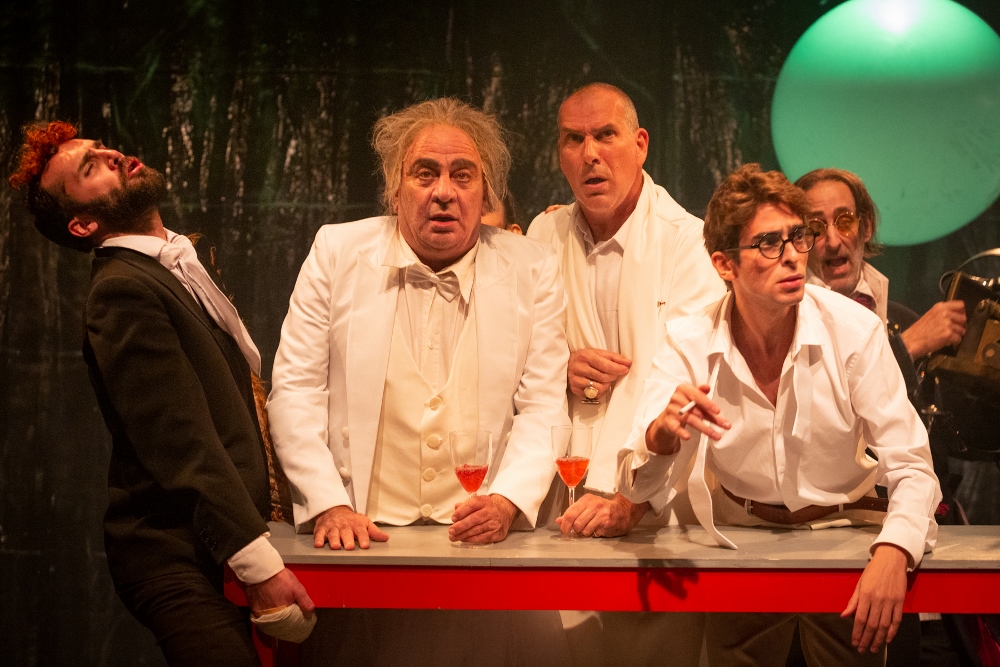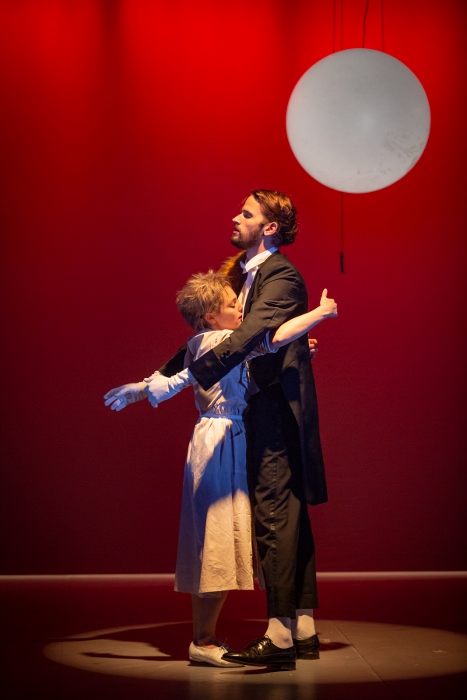Nathan Alterman’s Inn of the Ghosts is a deeply disturbing play that engages with two central myths of the artist: the need to sacrifice all else (and all others) for the sake of one’s art, and the encounter with the devil at the crossroads. The Khan Theatre production, adapted and directed by Shir Goldberg is an alluring theatrical work, marked by excellent performances. Evoking works such as Faust and The Red Shoes in its themes, Inn of the Ghosts is replete with suffering, yet ultimately, the conclusions falls short of tragic, with an overall sense of ambivalence. Perhaps ambivalence is the tragedy of the 21st century.
The plot focuses on Hananel the violinist (Ariel Wolf) who feels he must leave his wife Naomi (Suzanna Papian) to pursue his destiny as an artist. The devoted Naomi not only sends him off lovingly, but sells herself as an indentured servant to the Money-changer (David Ben Zeev), giving the money to Hananel. The two lovers vow to meet again after 12 years. Stopping at an inn, Hananel encounters a Beggar (Yehoyachin Friedlander) who then accompanies him on the journey, becoming his impresario; ghosts who talk of art, criticism and culture; and the beautiful Innkeeper (Irit Pashtan).

The play follows the characters over the course of those 12 years, with Hananel and Naomi’s narrative arc taking place in parallel, with both actors on the stage. As Hananel’s star rises, one sees Naomi literally carrying an enormous burden, sinking under the weight of a huge black sack and stumbling as she makes her halting way across the stage. The sight of Naomi and her heavy burden weighs on the viewer, it is impossible to watch and remain unaffected. Having read the program notes after seeing the play, it became clear that the director intended the characters of Hananel and Naomi to be seen on a symbolic level as well, as two halves of a whole, representing the internal conflict of the artist torn between total dedication to one’s art and the other life that might have been – a life with love, companionship and compassion. Yet the physical presence of the characters in the play, and in particular the suffering of Naomi, is so compelling, that I find it difficult to read this interpretation into the production.
There are many beautiful moments in the production, which has been enhanced with the addition of poems written by Alterman (not part of the original text) and performed, cabaret style by the Organ-grinder (Nir Ron). The intimate connection between art and eros is expressed in two strong scenes, to very different effect. In one, Hananel is with the Innkeeper, and his fingers play upon her like a violin, connecting his infidelity to the utter immersion in his art. Later, this movement returns, as Hananel dances with Naomi, an expression of love and unity that but an illusion. The creative set design by Adam Keler contributes to the mood of the play, which takes place in the imagination as much as in the physical. The set is deceptively bare, with hidden features – such as treadmills embedded in the floor on either side of the stage, on which Hananel and Naomi walk their separate paths, both going nowhere – that emerge and disappear, changing the scene from inn to sauna, to Naomi’s bare room. The costume design by Tal Kilshon gives the play a sense of the past, as well as a fantastical feel in the ghost scenes.

Arie Tcherner is a delight in white tux and a tutu, he and the other lively ghosts convey the airy, emotionally volatile world of artists and critics with their jazzy abstractions and intellectual sparring that is ultimately perhaps ineffectual and of no consequence. As the Innkeeper, Irit Pashtan creates a character that is by turns alluring, manipulative, dangerous, and touchingly vulnerable, even as she endures – a wonderful performance! Yehoyachin Friedlander makes a great devil, that is, beggar, with a charming demeanor and a manic gleam in his eye. Suzanna Papian delivers a moving performance as Naomi, expanding the archetype of blind love and sacrifice, to depict a character of integrity and courage. There is a sense of closure to Naomi’s story arc, that is missing from that of Hananel. Portrayed with sensitivity by Ariel Wolf, there is an ease in his acceptance of all that comes his way, a lack of introspection. Hananel lives an illusion, when it shatters, he is left with nothing but fragments of a tale he does not understand.
Inn of the Ghosts
Modern adaptation of Hebrew Classics
By Nathan Alterman
Adapted and directed by Shir Goldberg; Set and Design: Adam Keler; Costume Design: Tal Kilshon; Lighting Design: Roni Cohen; Music: Shlomi Bertonov; Choreography: Ariel Wolf; Dialogue Coach: Anat Zamshteigman; Actors (in order of appearance): Ariel Wolf – Hananel; Suzanna Papian – Naomi; Nir Ron – Organ-grinder; Yaniv Segal – Monkey; Or Lumbrozo – Lass, Woman; Arie Tcherner – Banker, Ghost C, Music Lover; Yehoyachin Friedlander – Beggar, Impresario; Irit Pashtan – Innkeeper; Shachar Netz – Ghost A, Reporter, Policeman; David Ben Zeev – Ghost B, Money Changer; Itai Szor – Money Changer’s Son.






